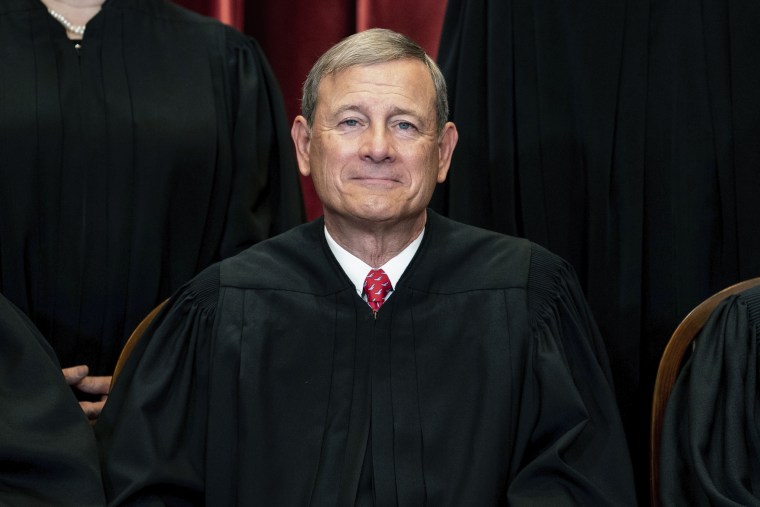In the Supreme Court’s Planned Parenthood v. Casey ruling in 1991, in which the justices upheld Roe v. Wade, the majority wrote, “Like the character of an individual, the legitimacy of the Court must be earned over time.” In their dissent in Dobbs v. Jackson Women’s Health Organization, Justices Stephen Breyer, Elana Kagan, and Sonia Sotomayor added that the legitimacy of the Supreme Court “can be destroyed much more quickly.”
The center-left jurists went on to note that the ruling overturning Roe “undermines the Court’s legitimacy.”
It’s a word that’s come up quite a bit in recent months. With the institution being pushed dramatically to the right by Republican-appointed justices — this is, by some measures, the most conservative court since the early 1930s — critics of the court’s direction haven’t just questioned the majority’s judgment, they’ve also raised concerns about the toll on the branch’s legitimacy.
Chief Justice John Roberts has heard such talk. As the Associated Press reported, he apparently doesn’t care for it.
Chief Justice John Roberts on Friday defended the authority of the Supreme Court to interpret the Constitution, saying its role should not be called into question just because people disagree with its decisions. When asked to reflect on the last year at the court in his first public appearance since the U.S. Supreme Court overturned Roe v. Wade, Roberts said he was concerned that lately some critics of the court’s controversial decisions have questioned the legitimacy of the court, which he said was a mistake.
“You don’t want the political branches telling you what the law is. And you don’t want public opinion to be the guide of what the appropriate decision is,” Roberts said at a judicial conference in Colorado. He added, “Yes, all of our opinions are open to criticism. In fact, our members do a great job of criticizing some opinions from time to time. But simply because people disagree with an opinion is not a basis for criticizing the legitimacy of the court.”
It’s tempting to dwell on the chief justice’s assertion that we don’t want the political branches telling us what the law is. After all, our system is based on the idea that we elect lawmakers whose job entails writing laws. Perhaps we’ll consider this in more detail in a separate post.
For now, however, let’s instead direct our attention to Roberts’ flawed defense.
To hear the chief justice tell it, the court’s critics of late — lawyers, scholars, journalists, rank-and-file voters, even some sitting justices, et al. — are throwing a misguided fit. Sure, we’re all welcome to criticize rulings we disagree with, but according to Roberts, we go too far when we question the legitimacy of the Supreme Court itself.
But I can’t help but wonder whether the chief justice fully appreciates the nature — and the nuances — of the criticism.
By all appearances, Roberts cares deeply about the high court’s reputation. It is very easy to believe he’s sincere in his wishes that Americans perceive the institution as apolitical, led by dispassionate jurists who simply do their best to call balls and strikes without regard for parties or ideological agendas.
The problem, of course, is that this vision has been largely shattered.
To be sure, some of the blame should be directed at Senate Republicans, many of whom launched a deliberate, years-long campaign to politicize the federal judiciary. The developments are still fresh in our minds: In early 2016, GOP senators refused to consider Merrick Garland’s nomination. In late 2016, several Senate Republicans said they would simply refuse, indefinitely, to confirm a Democratic president’s Supreme Court nominees, regardless of election results, and regardless of prospective nominees’ merits.
In early 2017, GOP senators completed the theft of a seat on the high court. In 2018, those same senators confirmed a tarnished nominee with damaged credibility. In late 2020, ignoring the principles they pretended to take seriously four years earlier, Republicans confirmed another nominee while early voting was underway.
Are these the kind of developments that take a sledgehammer to high-minded ideals about a politically independent institution worthy of broad respect? You bet they are.
Roberts might argue that it’s not the institution’s fault that GOP politicians have engaged in such abusive tactics. That’s true. But it also doesn’t change the fact that Republicans’ efforts have fundamentally altered the Supreme Court and Americans’ confidence in it.
Just as important, of course, is the justices’ own rulings. As The Washington Post’s Ruth Marcus explained in her latest column:
The inflamed public reaction stems also from the fact that the law changed because the court’s membership changed. The ruling in Dobbs v. Jackson Women’s Health Organization was the culmination of a political and politicized process to bolster the conservative majority by any means necessary. And this stacked court has — time after time, but most flagrantly in overruling Roe v. Wade — abandoned normal rules of restraint, twisted or ignored doctrine, and substituted raw power to achieve its desired result.... And this is how the institution undermines its own legitimacy. If the court behaves like just another political body, it loses the only power it has, of achieving public acceptance of its rulings.
When Republican-appointed justices ignore precedents they’d previously said they’d uphold, it undermines the court’s legitimacy. When Republican-appointed justices deliver overtly political speeches, it undermines the court’s legitimacy. When Republican-appointed justices take aim at fundamental American principles, such as the separation of church and state, simply because they can, it undermines the court’s legitimacy.
It may give Roberts comfort to think the recent backlash against the Supreme Court is little more than an emotional outburst in response to a deeply unpopular, society-changing ruling. But I’d encourage the chief justice to look beyond such superficiality and consider why, exactly, his institution’s credibility and legitimacy has suffered so greatly.

